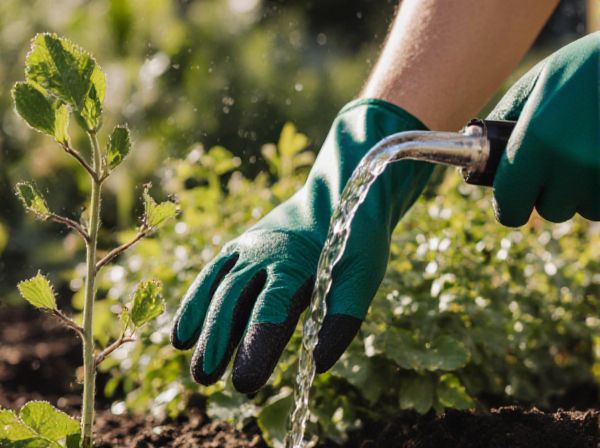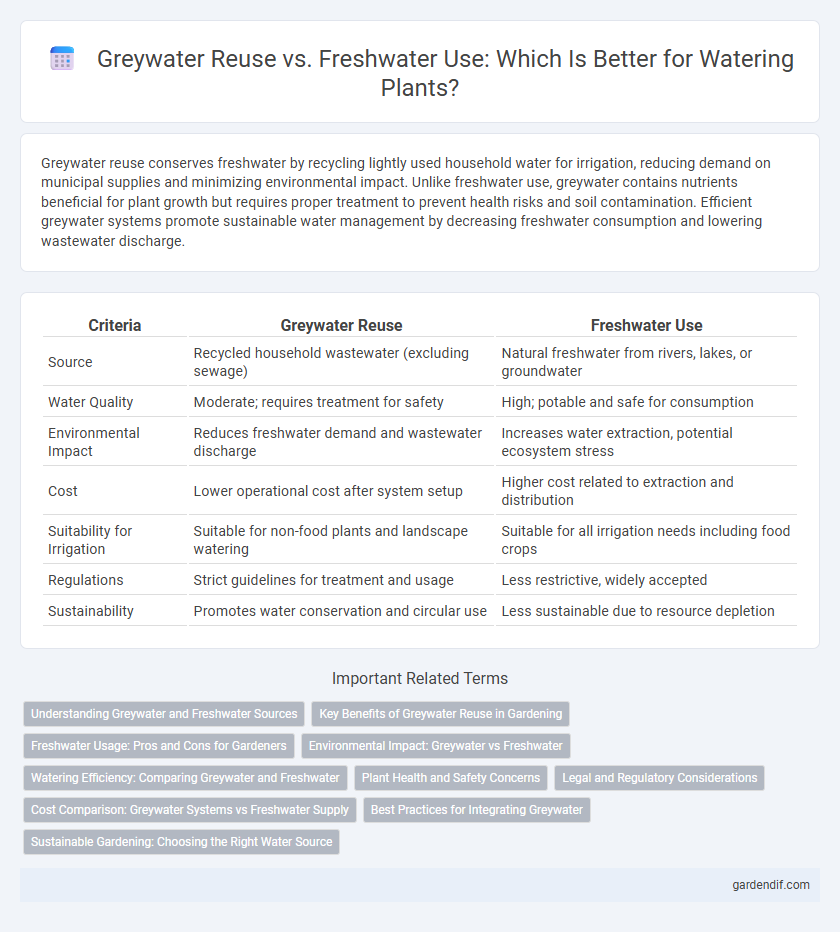
Greywater reuse vs Freshwater use Illustration
Greywater reuse conserves freshwater by recycling lightly used household water for irrigation, reducing demand on municipal supplies and minimizing environmental impact. Unlike freshwater use, greywater contains nutrients beneficial for plant growth but requires proper treatment to prevent health risks and soil contamination. Efficient greywater systems promote sustainable water management by decreasing freshwater consumption and lowering wastewater discharge.
Table of Comparison
| Criteria | Greywater Reuse | Freshwater Use |
|---|---|---|
| Source | Recycled household wastewater (excluding sewage) | Natural freshwater from rivers, lakes, or groundwater |
| Water Quality | Moderate; requires treatment for safety | High; potable and safe for consumption |
| Environmental Impact | Reduces freshwater demand and wastewater discharge | Increases water extraction, potential ecosystem stress |
| Cost | Lower operational cost after system setup | Higher cost related to extraction and distribution |
| Suitability for Irrigation | Suitable for non-food plants and landscape watering | Suitable for all irrigation needs including food crops |
| Regulations | Strict guidelines for treatment and usage | Less restrictive, widely accepted |
| Sustainability | Promotes water conservation and circular use | Less sustainable due to resource depletion |
Understanding Greywater and Freshwater Sources
Greywater consists of gently used water from sinks, showers, and laundry, containing fewer contaminants than blackwater but still requiring treatment before irrigation. Freshwater sources include rivers, lakes, and underground aquifers, typically offering clean, potable water but facing increasing scarcity and higher costs. Efficiently distinguishing these sources helps optimize water reuse in irrigation, reducing overall freshwater demand and supporting sustainable landscaping practices.
Key Benefits of Greywater Reuse in Gardening
Greywater reuse in gardening significantly conserves freshwater resources by recycling water from sinks, showers, and washing machines for irrigation, reducing household water consumption by up to 50%. This practice enriches soil moisture, enhances plant growth, and lowers water bills without compromising plant health. Utilizing greywater also decreases the burden on wastewater treatment facilities, promoting sustainable water management and environmental protection.
Freshwater Usage: Pros and Cons for Gardeners
Freshwater use for garden watering provides a reliable, pathogen-free source supporting diverse plant health and growth. It helps maintain soil structure and nutrient balance without the risk of contaminants found in greywater, ensuring safe food cultivation. However, reliance on freshwater contributes to increased demand on municipal supplies and can lead to resource depletion in drought-prone areas.
Environmental Impact: Greywater vs Freshwater
Using greywater for irrigation significantly reduces freshwater consumption, thereby conserving vital water resources and decreasing the strain on municipal water supplies. Greywater reuse lowers the volume of wastewater discharged into sewage systems, mitigating the risk of water pollution and reducing the energy required for wastewater treatment. In contrast, relying solely on freshwater for watering increases demand on natural water bodies, exacerbating environmental issues like habitat degradation and water scarcity.
Watering Efficiency: Comparing Greywater and Freshwater
Greywater reuse for watering significantly enhances water efficiency by reducing freshwater consumption and alleviating pressure on municipal supplies. Studies show greywater contains nutrients beneficial for plants, improving soil moisture retention and minimizing irrigation frequency compared to freshwater use. Implementing greywater systems can decrease overall water usage by up to 50%, promoting sustainable landscaping practices.
Plant Health and Safety Concerns
Greywater reuse for watering plants reduces freshwater consumption but requires careful treatment to prevent the buildup of harmful salts, pathogens, and chemicals that can damage plant health. Proper filtration and disinfection processes are critical to mitigate risks associated with contaminants such as detergents and bacteria that may impair soil quality and plant growth. Unlike freshwater, which poses fewer safety concerns, greywater's variable composition necessitates strict management to ensure safe and effective irrigation without compromising plant vitality.
Legal and Regulatory Considerations
Legal and regulatory frameworks for greywater reuse in irrigation vary widely, with many jurisdictions imposing strict guidelines on treatment, storage, and application to protect public health and the environment. Regulations often require greywater to meet specific quality standards, restrict its use in edible crops, and mandate proper signage and system maintenance. In contrast, freshwater use typically faces fewer regulatory constraints but is subject to water rights and conservation policies aimed at sustainable resource management.
Cost Comparison: Greywater Systems vs Freshwater Supply
Greywater reuse systems can reduce water bills by up to 50% compared to traditional freshwater irrigation, offering significant long-term cost savings despite higher initial installation expenses. Freshwater supply relies on ongoing utility payments and can be more expensive during drought or peak demand periods, whereas greywater systems lower operational costs by recycling household wastewater. Maintenance costs for greywater systems are generally moderate and offset by reduced freshwater consumption, making them an economically efficient solution for sustainable watering.
Best Practices for Integrating Greywater
Integrating greywater reuse for watering enhances water efficiency by reducing freshwater consumption and promoting sustainable landscaping. Best practices include proper filtration to remove contaminants, selecting appropriate irrigation systems like drip watering to prevent soil contamination, and complying with local regulations to ensure safe usage. Monitoring soil moisture and plant health optimizes water application, reducing waste and supporting long-term garden vitality.
Sustainable Gardening: Choosing the Right Water Source
Greywater reuse significantly conserves freshwater by recycling household water for irrigation, reducing the demand on municipal water supplies and lowering environmental impact. Sustainable gardening benefits from greywater systems that provide nutrient-rich water, promoting healthier plant growth while minimizing water waste. Freshwater use remains essential for sensitive plants and potable needs, but integrating greywater reuse optimizes water efficiency in sustainable garden practices.
Greywater reuse vs Freshwater use Infographic

 gardendif.com
gardendif.com